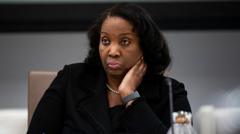Can Trump Fire Fed Governor Cook? Judge Puts a Stop to It!

Published: 2025-09-10 03:20:07 | Category: technology
In a significant legal development, a federal judge has temporarily blocked President Donald Trump from dismissing Federal Reserve Governor Lisa Cook, highlighting the ongoing debate regarding the independence of the US central bank. The case raises important questions about the boundaries of presidential authority over federal officials.
Last updated: 18 October 2023 (BST)
Key Takeaways
- A federal judge has ruled against Trump's attempt to fire Fed Governor Lisa Cook, affirming her position on the board.
- The case revolves around allegations of mortgage fraud against Cook, which she denies.
- This legal battle may set a precedent for the independence of the Federal Reserve from political influence.
- The law governing the Federal Reserve allows for removal "for cause," but does not clearly define what constitutes sufficient cause.
- The case is likely to escalate to the US Supreme Court, further testing the limits of presidential power.
The Background of the Case
In August, President Trump stated that he had dismissed Lisa Cook, a member of the board of governors at the Federal Reserve, following allegations that she misrepresented her financial information on mortgage applications. However, the Federal Reserve has maintained that Cook remains in her position, leading to a legal confrontation that is unprecedented in nature.
Cook's legal team has struck back, asserting that Trump's allegations are baseless and that his dismissal order is "unlawful and void." This case underscores the delicate balance between the executive branch and the Federal Reserve, an institution designed to operate independently from political pressures.
The Allegations Against Cook
Trump and Federal Housing and Finance Authority director William Pulte have accused Cook of inaccurately describing properties on mortgage applications, potentially allowing her access to lower interest rates and tax credits. Cook has denied these claims, stating that they are unfounded and politically motivated.
Legal Implications of the Case
The crux of this legal battle lies in the interpretation of the Federal Reserve Act, which stipulates that governors can only be removed "for cause." However, the law does not explicitly define "cause" or outline the procedure for removal, leaving significant ambiguity. This lack of clarity presents a challenge for courts and could lead to further legal scrutiny.
Potential Outcomes and Impact
This ruling is pivotal not only for Cook but also for the future of the Federal Reserve's autonomy. A precedent set by this case could either reinforce or undermine the independence of the central bank, which is crucial for maintaining stable economic policy free from political influence. The outcome may determine how future presidents interact with the Fed and its governors.
The Ongoing Legal Battle
Cook's lawsuit against Trump is just the beginning. The preliminary ruling by the federal judge does not resolve the core issue regarding whether the allegations against her are sufficient for removal. As the legal arguments unfold, it is expected that this case will escalate to the US Supreme Court, where it will be closely scrutinised.
The Federal Reserve's Role
The Federal Reserve plays a key role in the US economy, primarily through its control of interest rates and regulation of financial institutions. A governor's ability to fulfil their duties without political interference is fundamental to the Fed's operational integrity. The outcome of this case could set a significant precedent for how the Fed functions in the future.
Upcoming Federal Reserve Meeting
As the Federal Reserve prepares for an upcoming meeting, where it is anticipated to announce its first interest rate cut since September 2024, the implications of this legal battle could have ripple effects on economic policy. Market participants will be closely watching how this situation develops, as it could influence decisions regarding monetary policy in the near future.
Conclusion
The legal tussle between President Trump and Governor Cook raises critical questions about the separation of powers and the independence of the Federal Reserve. As this case progresses, it will be vital to observe how the judiciary interprets the law governing the Fed and what this means for future presidential authority over federal officials. The outcome could redefine the relationship between the executive branch and the central bank, impacting economic policy for years to come.
As we await further developments, one must consider: how much influence should a sitting president have over the Federal Reserve, and what does this case reveal about the current state of political oversight in the US? #FederalReserve #LegalBattle #InterestRates
FAQs
What are the allegations against Lisa Cook?
Lisa Cook is accused of misrepresenting properties on mortgage applications, potentially allowing her to secure lower interest rates. Cook denies these allegations, claiming they are politically motivated.
Why is this case significant?
This case is significant as it tests the independence of the Federal Reserve and the limits of presidential authority over federal officials, potentially setting a precedent for future interactions between the executive branch and the central bank.
What does "for cause" mean in the context of the Federal Reserve Act?
"For cause" refers to the legal stipulation that a Federal Reserve governor can only be removed for specific reasons. However, the Act does not define what constitutes "cause," leading to ambiguity in enforcement.
What are the potential outcomes of this legal battle?
The potential outcomes include a reinforcement of the Federal Reserve's independence or a precedent that allows for greater presidential control, which could influence future economic policies and appointments within the Fed.
How could this case affect monetary policy?
The case could impact the Federal Reserve's ability to set interest rates without political pressure, potentially affecting economic stability and market confidence in the Fed's decisions.



